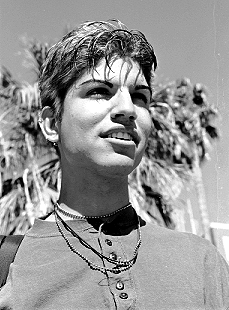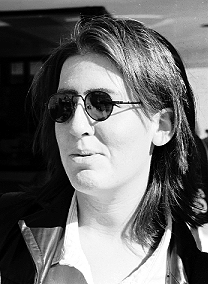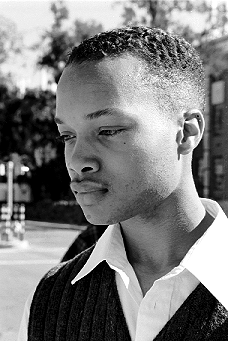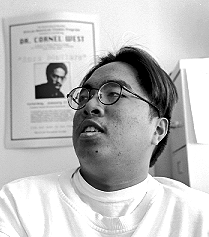In three seconds, you can send mail to someone on the other side of the earth.
In four and a half minutes, you can cook a full meal.
And in no time, you can produce a child with someone that you've never even met.
These are just a few conveniences technology has brought us. But is that the only thing?
It has also brought us many questions:
Should we produce a child artificially?
What do religions dictate?
What about the law?These are questions produced by the issue of egg and sperm donation. It is most commonly used to help infertile couples produce a child of their own.
It can be a quick buck for some, and a heavy moral obligation for others.
Religious arguments
Three religious groups on campus took a stance on this touchy issue.
Conservative Baptist Pastor Monte Coffman, director of Beal Student Center on campus, says he thinks receiving an egg or sperm from a donor is ethically wrong.
Coffman draws a parallel between adultery and searching outside of the marriage to unite a wife's egg with another man's sperm. He also says man is "playing God" by inducing this union.
The Catechism of the Catholic Church states, "techniques that entail the dissociation of husband and wife, by the intrusion of a person other than the couple (including the donation of sperm or ovum) are gravely immoral."
According to this, technology dominates human destiny when a couple "entrust(s) the life and identity of the embryo into the power of doctors and biologists."
"If God doesn't want it, then they're (the infertile couple) not going to have (children)," Coffman says.
El-Tayeb Abuelyaman, a visiting electrical engineering professor who prays at the Islamic mosque near the near university, also denounces the donation of egg and sperm.
Abuelyaman says he considers the use of donor gametes as cheating.
"People must go through certain (tests) to become (professionals)," he says. "If there is input from someone else to acquire degrees, then the degrees are not theirs. How can we consider a child to belong to a couple if the egg or sperm is not theirs?"
In the case of donor egg or sperm, he says "the identity of the child would be totally lost because (one parent) of the child would not be known because they are a donor." Abuelyaman stresses the importance of human identity in Islamic faith.
These religious viewpoints don't prohibit infertile couples from exploring other options.
"There are other solutions - adoption is one solution where the child can be just as much their own," Coffman says.
Abuelyaman suggests the infertile couple pray and have faith in Allah. He cites passages from the Koran where childless couples accepted infertility as Allah's will.
"God is fair and just, so if you look at people and average out all that they have, there is justice," he says.
A religious group that does approve of donating is the Pagans.
"It's (donating egg and sperm) not against paganism as long as it doesn't hurt anybody's feelings," says Raya Rand, former president of Arizona Student Pagans.
The different sects of paganism believe in worshipping nature and love in all living things, Rand says.
"If a man is content to raise a child conceived by artificial means, then we're happy with it," she says.
Abuelyaman questions the legitimacy of these children conceived artificially.
"If Allah did not give a couple a child through the natural way, then that child, according to the Islamic faith, is illegitimate," he says.
However, the Islamic faith will still accept the illegitimate child as a human since it should not pay for its parents' sins, he says.
Abuelyaman also predicts egg and sperm donation may be a tough job for lawyers in custody battles.
Legal considerations
George Dunscomb, a domestic relations attorney with the Tucson firm Dunscomb and Shepherd, says he's never heard of any court cases in Tucson about egg or sperm ownership.
He calls donating "highly risky" because of the potential ramifications that it could result.
Some of the potential problems could include intermarriage between children of the same father, and breaking state laws prohibiting "bastard" children and the refusal of child support by a mother.
It is against Arizona law for intermarriage between siblings, Dunscomb adds. He says that in theory, if two children of a sperm donor were to marry, this would be considered a violation of the law, even though neither child may know.
To help avoid such unions, the American Society of Reproductive Medicine policy states that male donors stay in the program until ten pregnancies result from their sperm.
However, David Karabinus, research assistant professor of obstetrics and gynecology, says that the organization does not monitor the amount of offspring from a donor.
"It is the responsibility of the clinic to monitor it," says Karabinus. "But the bottom line is for an area the size of Tucson, it has been shown that ten progeny has not had an effect on the gene pool."
With Tucson's population at roughly 750,000 people, finding an anonymous donor is nearly impossible.
Arizona also has a law stating that there are "no bastard children," Dunscomb says. This means the parent of every child is to be responsible as the parent.
Dunscomb also says that because of the laws in Arizona, a mother cannot waive the right to child support.
"In theory, a mother could file a child support action against the sperm-donor father," Dunscomb says.
A father has a legal obligation, even if the father didn't want the child, he says. This is because the law was made to benefit the child.
"(Donating sperm) puts the father in a precarious position," says Dunscomb.
The donation of an egg is even trickier, adds Dunscomb. The defense for an egg donor could be that a child cannot be made unless there is a father (and a mother to carry the fertilized egg to term). Without the father's sperm and mother's womb, there is no child.
"It's a tough question," Dunscomb says. "I can't see this scenario coming into court."
Dunscomb says if a mother wanted child support from her egg donor, then it should also be considered if the donor will then be allowed visiting rights.
The donor wanting custody of the child could also be a problem.
If the donor wanted to see the child and the mother was asking for child support, "I would deny both claims," Dunscomb says.
"The original woman gave up an egg and this could not produce a child on its own," Dunscomb says. "Also, a contract was signed.
"It's like going to the plasma center and donating organic material there," Dunscomb says. "It is the purchase of an egg."
Dr. Timothy Gelety, director of the reproductive endocrinology and infertility at University Medical Center, says that UMC's fertility clinic is not market-driven.
"Infertility is a big business and there is an enormous amount of money in it," Gelety says.
Gelety says the UMC clinic pays about a third of what private clinics pay their donors. He says the motivation for egg and sperm donors in UMC's clinic is "feeling satisfied" they've helped someone.
Even though it's more difficult for women to donate, the UMC clinic gives women the same ethical considerations men have, Gelety says.
"There haven't been any big ethical problems," Gelety says.
Some ethical dilemmas that have not been considered are how to tell children, produced through sperm and egg donors, who their biological parents are, he says.
The first children produced through donations are just getting old enough to understand where they came from, Gelety says. The parents will be the first to answer that question.
Dunscomb says, "The legal and moral issues are not answered, but they may have to be."
Would you donate your eggs or sperm? Yes, someone asked me to give them sperm...it's out of my body so I (am not responsible.)"
John Ponce de Leon
molecular and cellular biology and biochemistry freshman
Yes, because women that cannot have children should not be deprived of that happiness.
Sheri Miller
bilingual education junior
No, I want to be responsible for where it goes. I wouldn't be if I didn't know where it went, and I don't feel like masturbating anymore
Joshua Luckow
business sophomore
I don't want children of mine floating around society.
Jennifer Nichols
East Asian studies junior
No, because of the awkwardness of the situation.
Andre Gray
business administration freshman
No, because it's part of me that I'm giving away.
Jharvis Licera
pre-med sophomore












